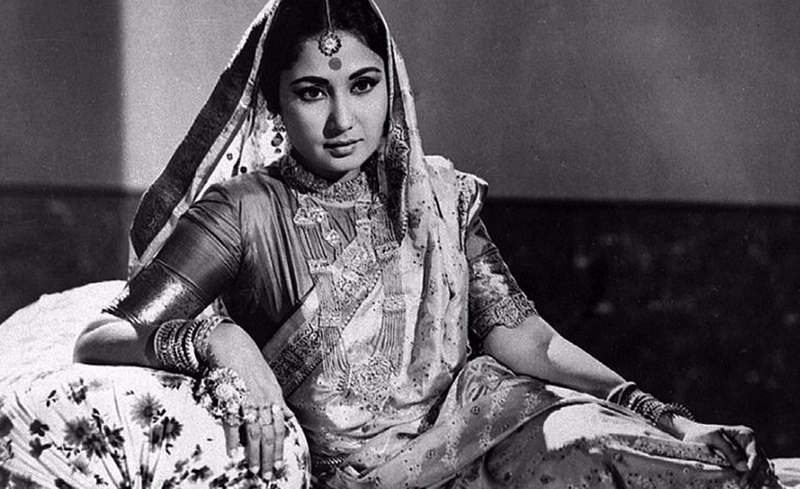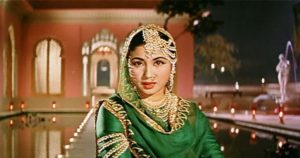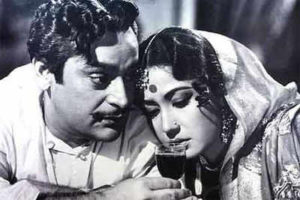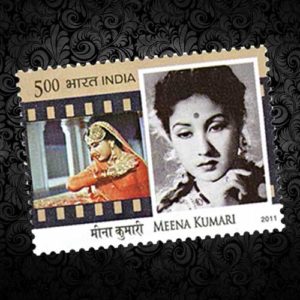The eternal Tragedy Queen

A tribute to legendary actor Meena Kumari on her 85th birth anniversary
Saurabh Tankha
My first memory of watching the great Meena Kumari on screen for the maiden occasion was in Pakeezah. I must have seen the 1972 Indian classic cult movie more than a decade after its release and I simply fell in love with Sahibjaan, the character Meena Kumari played in the film. The pathos, the helplessness, the frustration, the love… in fact, all the emotions displayed by Meena Kumari in this movie are simply outstanding. And why this one alone? The ease with which the eternal “tragedy queen” performed in each of her films in a career spanning 33 years, from being a child actor to one of the most successful heroines ever, is worth a praise over and over again.
Meena Kumari was born as Mahjabeen Bano on August 1, 1933 to poor theatre artistes, Ali Bux and Iqbal Begum. As she came after the birth of two girls – Khursheed and Madhu – Ali Bux initially couldt accept her; he left her at a Muslim orphanage — he wanted a son. But he had a change of heart and went back and got her home soon after. Not many know that Meena Kumari’s grandmother Hem Sundari Thakur (nee Mukherjee) was married into the Tagore family but after she lost her husband, Jadu Nath Tagore who was a distant cousin of Rabindranath Tagore, she was forced by the Tagore clan to give up her rights to the family name or property. She had a daughter, Prabhavati Thakur (Tagore) who later married a Pathan called Ali Bux. After marriage, she changed her name to Iqbal Begum.
As it was difficult for the Bux family to make ends meet, her parents took Meena to various studios for a role following which noted producer-director- screenwriter Vijay Bhatt (who made films like Baiju Bawra, Himalaya Ki Gode Mein and Goonj Uthi Shehnai) cast her in Leatherface. On her first day, she was paid Rs 25 and thus began the journey of Baby Meena. Thereafter, she acted in Adhuri Kahani, Pooja, Ek Hi Bhool, Nai Roshni, Bahen and many other movies as a child artiste.
Who can ever forget the 1962 release, Sahib, Bibi Aur Ghulam based on Bengali novel, Shaheb Bibi Gholam, by famous Bengali author, Bimal Mitra? Her portrayal of Chhoti Bahu, in fact, is regarded as one of the best performances of Hindi cinema till date by critics. And I agree. It is difficult getting over her singing na jaao saiyaan chhuda ke baiyaan… with loads of intensity as she longs for the return of her husband (played by Rehman), turning into a desperate alcoholic to make him stay home. Interestingly, this movie was chosen as India’s official entry to the Oscars but was not accepted by the Academy as a nominee as “a woman who drinks was not permissible in their culture”.
Though Meena Kumari did over 90 movies, including classics like Dil Ek Mandir, Phool Aur Pathar, Main Chup Rahungi, Dil Apna Aur Preet Parayi and Aarti, I feel Pakeezah and Saheb, Bibi Aur Ghulam are a cut above the rest. While most actor then, and even now, use glycerine to show tears, her eyes well up naturally; she was that emotional!
Meena Kumari, who died of liver cirrhosis on March 31, 1972 has an inscription on her tombstone which aptly describes her life and reads: “She ended life with a broken fiddle, with a broken song, with a broken heart, but not a single regret.” She was just 38. Truly an actor who should have stayed with us longer and lived a happier and peaceful life, away from the pain and turmoil that she was always engulfed in. And perhaps her tombstone inscription then could have read: “She ended life peacefully, with a complete song, a contended heart and not a single regret.”
Tid bits
Back in the 60s, Meena Kumari set a new fashion trend of girls wearing lungi. She wore one for Mausam hai aashiqana in Pakeezah back in 1969 when the shooting of the movie restarted after a break.
During her times, she was the highest paid female actors and the first one to buy an Impala car in those days.
She was an avid reader of novels by Agatha Christie.
She always kept mogra flowers by her bed before she slept.
A postal stamp of face value Rs 5 was issued in honour of Meena Kumari on February 13, 2011.
She was a talented poetess and wrote under pseudonym Naaz.
She was a playback singer who rendered voice to songs from movies like Duniya Ek Sarai, Piya Ghar Aaja and Pinjre Ke Panchhi.






